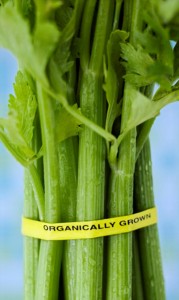Organic Foods: Behind the Label
A new year is often seen as an opportunity to implement healthier eating habits. Many families have jumped on the “organic” bandwagon in recent years, and you may be considering joining them. Once only the specialty of health food stores, an ever increasing quantity and variety of organic foods can now be found on the shelves of every major food store.
 You may be wondering what the difference is between many organic foods or what do labels touting foods as “sustainable,” “natural,” “free-range,” or “grass-fed” actually mean. The following tips will help you understand what’s behind the label.
You may be wondering what the difference is between many organic foods or what do labels touting foods as “sustainable,” “natural,” “free-range,” or “grass-fed” actually mean. The following tips will help you understand what’s behind the label.
Defining Organic
If a food is labeled “organic,” it meets the organic standards set by the U.S. Department of Agriculture (USDA), and is grown without:
- Pesticides
- Fertilizers made with synthetic ingredients or sewage sludge
- Herbicides
- Antibiotics
- Bioengineering
- Hormones
- Ionizing radiation
Organic animal products — meat, poultry, eggs, and dairy foods — come from animals that are fed 100% organic feed products, receive no antibiotics or growth hormones, and have access to the outdoors.
If a product is labeled “organic,” a government-approved certifier has inspected the farm where it was produced to ensure that the growers followed all the rules necessary to meet the USDA’s organic standards. Farmers producing organic foods use renewable resources that conserve the soil and water for future generations. Any company handling or processing the food on its way to the grocery store must be certified organic, too. Foods labeled “organic” are either:
- 100% Organic (completely organic or made of all organic ingredients),
- Organic (at least 95% organic), or
- Made with organic ingredients (the food contains at least 70% organic ingredients, but can’t be labeled as “organic”).
Sustainable Foods
Another term you might hear is “sustainable food.” Sustainable foods are grown locally using techniques that don’t harm the environment, are seasonal, and preserve agricultural land. Sustainable practices are humane to animals, pay growers fairly, and support local farming communities by distributing their food through farmer’s markets and other local venues.
You Might Also See:
- Cage-Free or Free Range: Seen on eggs or poultry products, these terms can be misleading. “Cage-free” implies that birds were not housed in cages, but is not a guarantee that they had access to the outdoors — or to roam freely — and it isn’t verified by any third party. For eggs to be considered “free range,” producers must demonstrate that poultry has been allowed access to open-air. The USDA, however, has no requirements as to the amount of time spent outdoors, nor the size or quality of the outside range.
- Grass-Fed/Open Pasture: “Grass-fed” signifies that the livestock received a diet of natural forage outdoors, but sometimes cows are fed grass while indoors or in a pen, or only for the first few months of their lives. So “grass-fed” can — but doesn’t always— mean “pasture-raised” or “open pasture.” Pasture-raised animals roam freely outdoors where they can eat natural grasses and other plants.
Natural Foods
Natural foods are minimally processed and remain as close as possible to their original state. Natural foods don’t have to adhere to the same rigorous standards as organic foods. However, the term “natural” generally means that a product has no artificial ingredients or preservatives, and that meat or poultry is minimally processed and free of artificial ingredients. Natural foods can be organic, but not all are. If you want to be sure that what you’re eating is organic, look for the “organic” labeling.
Getting More Information
Understanding these terms and their meanings can be confusing. The USDA is now developing consistency standards for labels like grass-fed, pasture-raised, and others that will be subject to USDA inspection. Also, many individual food producers, dairies, farms, and orchards have websites you can visit to find out more about their standards.
For more information on organic eating, visit KidsHealth.org.
Suzanne Sheres MMSc, RD, LD/N, CDE is a registered dietitian at Nemours Children’s Clinic in the Division of Endocrinology which provides services to treat children of all ages with diabetes, growth disorders and other conditions of the endocrine system









